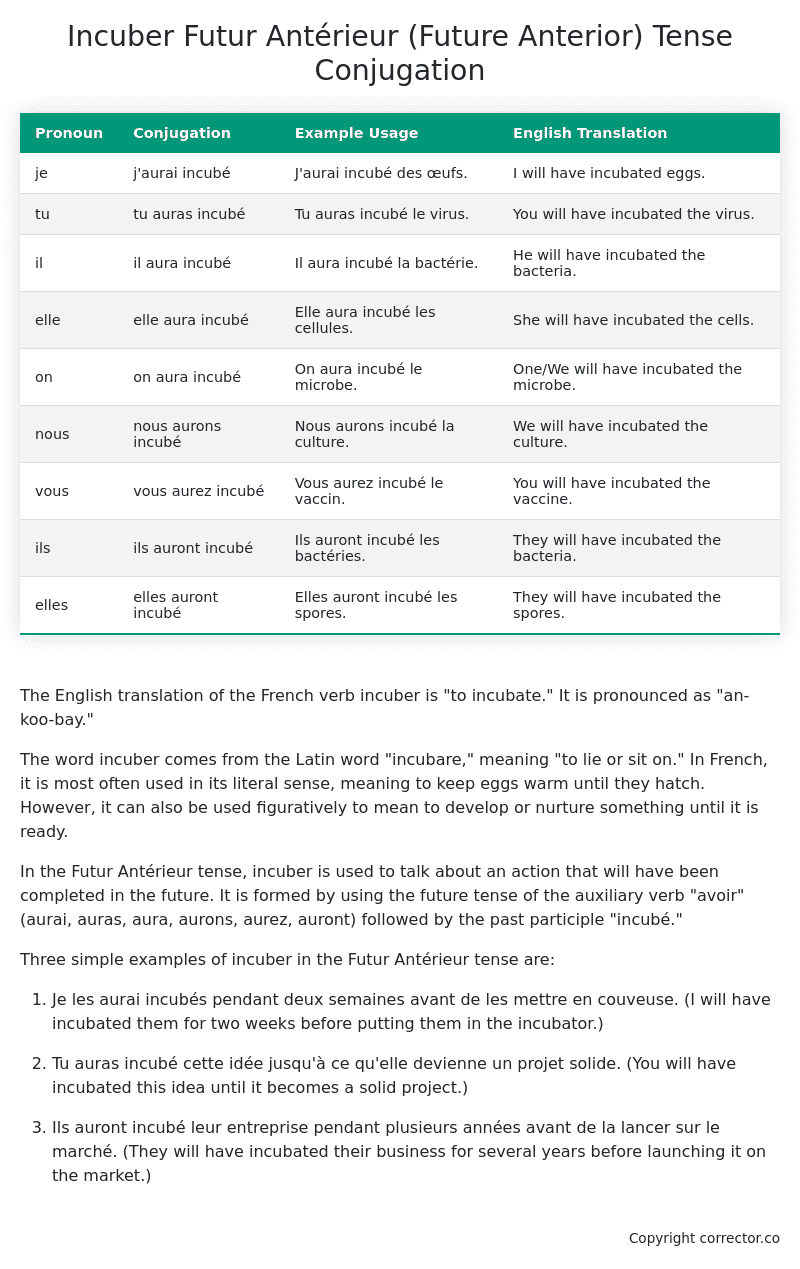Futur Antérieur (Future Anterior) Tense Conjugation of the French Verb incuber
Introduction to the verb incuber
The English translation of the French verb incuber is “to incubate.” It is pronounced as “an-koo-bay.”
The word incuber comes from the Latin word “incubare,” meaning “to lie or sit on.” In French, it is most often used in its literal sense, meaning to keep eggs warm until they hatch. However, it can also be used figuratively to mean to develop or nurture something until it is ready.
In the Futur Antérieur tense, incuber is used to talk about an action that will have been completed in the future. It is formed by using the future tense of the auxiliary verb “avoir” (aurai, auras, aura, aurons, aurez, auront) followed by the past participle “incubé.”
Three simple examples of incuber in the Futur Antérieur tense are:
-
Je les aurai incubés pendant deux semaines avant de les mettre en couveuse. (I will have incubated them for two weeks before putting them in the incubator.)
-
Tu auras incubé cette idée jusqu’à ce qu’elle devienne un projet solide. (You will have incubated this idea until it becomes a solid project.)
-
Ils auront incubé leur entreprise pendant plusieurs années avant de la lancer sur le marché. (They will have incubated their business for several years before launching it on the market.)
Table of the Futur Antérieur (Future Anterior) Tense Conjugation of incuber
| Pronoun | Conjugation | Example Usage | English Translation |
|---|---|---|---|
| je | j’aurai incubé | J’aurai incubé des œufs. | I will have incubated eggs. |
| tu | tu auras incubé | Tu auras incubé le virus. | You will have incubated the virus. |
| il | il aura incubé | Il aura incubé la bactérie. | He will have incubated the bacteria. |
| elle | elle aura incubé | Elle aura incubé les cellules. | She will have incubated the cells. |
| on | on aura incubé | On aura incubé le microbe. | One/We will have incubated the microbe. |
| nous | nous aurons incubé | Nous aurons incubé la culture. | We will have incubated the culture. |
| vous | vous aurez incubé | Vous aurez incubé le vaccin. | You will have incubated the vaccine. |
| ils | ils auront incubé | Ils auront incubé les bactéries. | They will have incubated the bacteria. |
| elles | elles auront incubé | Elles auront incubé les spores. | They will have incubated the spores. |
Other Conjugations for Incuber.
Le Present (Present Tense) Conjugation of the French Verb incuber
Imparfait (Imperfect) Tense Conjugation of the French Verb incuber
Passé Simple (Simple Past) Tense Conjugation of the French Verb incuber
Passé Composé (Present Perfect) Tense Conjugation of the French Verb incuber
Futur Simple (Simple Future) Tense Conjugation of the French Verb incuber
Futur Proche (Near Future) Tense Conjugation of the French Verb incuber
Plus-que-parfait (Pluperfect) Tense Conjugation of the French Verb incuber
Passé Antérieur (Past Anterior) Tense Conjugation of the French Verb incuber
Futur Antérieur (Future Anterior) Tense Conjugation of the French Verb incuber (this article)
Subjonctif Présent (Subjunctive Present) Tense Conjugation of the French Verb incuber
Subjonctif Passé (Subjunctive Past) Tense Conjugation of the French Verb incuber
Subjonctif Imparfait (Subjunctive Imperfect) Tense Conjugation of the French Verb incuber
Subjonctif Plus-que-parfait (Subjunctive Pluperfect) Tense Conjugation of the French Verb incuber
Conditionnel Présent (Conditional Present) Tense Conjugation of the French Verb incuber
Conditionnel Passé (Conditional Past) Tense Conjugation of the French Verb incuber
L’impératif Présent (Imperative Present) Tense Conjugation of the French Verb incuber
L’infinitif Présent (Infinitive Present) Tense Conjugation of the French Verb incuber
Struggling with French verbs or the language in general? Why not use our free French Grammar Checker – no registration required!
Get a FREE Download Study Sheet of this Conjugation 🔥
Simply right click the image below, click “save image” and get your free reference for the incuber Futur Antérieur tense conjugation!

Incuber – About the French Futur Antérieur (Future Anterior) Tense
Construction
Common Everyday Usage Patterns
Interactions with Other Tenses
For example
Summary
I hope you enjoyed this article on the verb incuber. Still in a learning mood? Check out another TOTALLY random French verb conjugation!


